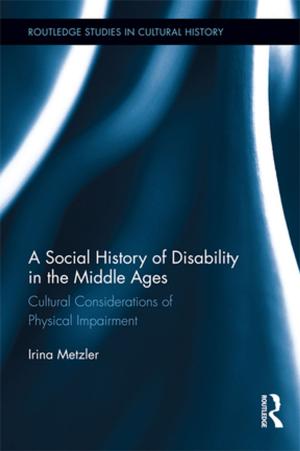Clinical Values
Emotions That Guide Psychoanalytic Treatment
Nonfiction, Health & Well Being, Psychology, Clinical Psychology, Emotions| Author: | Sandra Buechler | ISBN: | 9781135061005 |
| Publisher: | Taylor and Francis | Publication: | April 15, 2013 |
| Imprint: | Routledge | Language: | English |
| Author: | Sandra Buechler |
| ISBN: | 9781135061005 |
| Publisher: | Taylor and Francis |
| Publication: | April 15, 2013 |
| Imprint: | Routledge |
| Language: | English |
In this refreshingly honest and open book, Sandra Buechler looks at therapeutic process issues from the standpoint of the human qualities and human resourcefulness that the therapist brings to each clinical encounter. Her concern is with the clinical values that shape the psychoanalytically oriented treatment experience. How, she asks, can one person evoke a range of values--curiosity, hope, kindness, courage, sense of purpose, emotional balance, the ability to bear loss, and integrity--in another person and thereby promote psychological change? For Buechler, these core values, and the emotions that infuse them, are at the heart of the clinical process. They permeate the texture and tone, and shape the content of what therapists say. They provide the framework for formulating and working toward treatment goals and keep the therapist emotionally alive in the face of the often draining vicissitudes of the treatment process.
Clinical Values: Emotions That Guide Psychoanalytic Treatment is addressed to therapists young and old. By focusing successively on different emotion-laden values, Buechler shows how one value or another can center the therapist within the session. Taken together, these values function as a clinical compass that provides the therapist with a sense of direction and militates against the all too frequent sense of "flying by the seat of one's pants." Buechler makes clear that the values that guide treatment derive from the full range of the clinician's human experiences, and she is candid in relating the personal experiences--from inside and outside the consulting room--that inform her own matrix of clinical values and her own clinical approach. A compelling record of one gifted therapist's pathway to clinical maturity, Clinical Values has a more general import: It exemplifies the variegated ways in which productive clinical work of any type ultimately revolves around the therapist's ability to make the most of being "all too human."
In this refreshingly honest and open book, Sandra Buechler looks at therapeutic process issues from the standpoint of the human qualities and human resourcefulness that the therapist brings to each clinical encounter. Her concern is with the clinical values that shape the psychoanalytically oriented treatment experience. How, she asks, can one person evoke a range of values--curiosity, hope, kindness, courage, sense of purpose, emotional balance, the ability to bear loss, and integrity--in another person and thereby promote psychological change? For Buechler, these core values, and the emotions that infuse them, are at the heart of the clinical process. They permeate the texture and tone, and shape the content of what therapists say. They provide the framework for formulating and working toward treatment goals and keep the therapist emotionally alive in the face of the often draining vicissitudes of the treatment process.
Clinical Values: Emotions That Guide Psychoanalytic Treatment is addressed to therapists young and old. By focusing successively on different emotion-laden values, Buechler shows how one value or another can center the therapist within the session. Taken together, these values function as a clinical compass that provides the therapist with a sense of direction and militates against the all too frequent sense of "flying by the seat of one's pants." Buechler makes clear that the values that guide treatment derive from the full range of the clinician's human experiences, and she is candid in relating the personal experiences--from inside and outside the consulting room--that inform her own matrix of clinical values and her own clinical approach. A compelling record of one gifted therapist's pathway to clinical maturity, Clinical Values has a more general import: It exemplifies the variegated ways in which productive clinical work of any type ultimately revolves around the therapist's ability to make the most of being "all too human."















